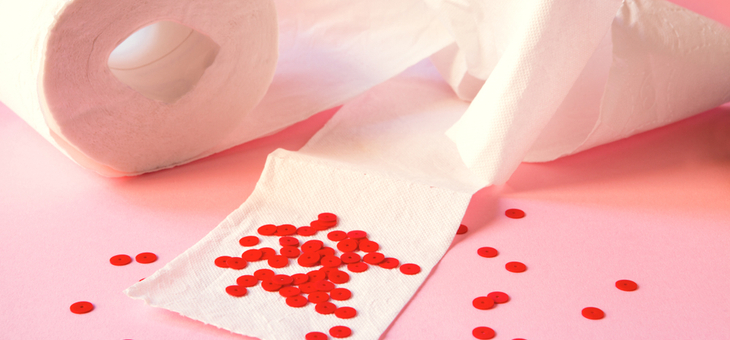Poo usually only interests infants and children’s authors, for whom matters scatological are disproportionately hilarious (and profitable in the latter’s case).
But finding blood in your poo is no laughing matter.
Advice site healthdirect.gov.au says many people dismiss it as nothing or they are too embarrassed to seek help.
“But blood in your stool can indicate a range of problems, some of which are very serious. If you have any blood in your stool, make sure you get it checked out by a doctor.”
If there’s blood and you feel faint, dizzy, feverish, confused, nauseated, or have bad stomach pain, it might be an emergency. You should go to the nearest emergency department as soon as possible or call triple zero (000) and ask for an ambulance.
These are not laughing matters for adults.
Colorectal (bowel) cancer
Firstly, and most importantly, blood when you go to the toilet can be a sign of a tumour in your colon or rectum. Bowel cancer affects one in 13 Australians in their lifetime and is Australia’s second deadliest cancer. In 2018, there were 5336 deaths from colorectal cancer in Australia (2870 males and 2466 females). It is such a widespread problem that the federal government operates the National Bowel Cancer Screening Program, a free test you can complete at home. During the early stages of bowel cancer, people may have no symptoms, which is why screening is so important.
The program’s information booklet is titled A Simple Bowel Test Could Save Your Life .
“The screening test checks for tiny traces of blood in the bowel motion (poo) of people who do not have symptoms,” it says.
Read more: Tips for reducing your bowel cancer risk
Haemorrhoids and anal fissures
This is the most common cause of rectal bleeding, says webmd.com. It happens when veins in your anus and rectum swell. Its causes include obesity, pregnancy and straining during bowel movements. It is an irritating, rather than serious condition which can be alleviated by adding fibre to the diet, drinking more water, avoiding sitting for long periods and increasing exercise levels.
Anal fissures are splits or tears in the skin around the anus, the opening at the end of the intestines where poo comes out. They can occur because a hard stool has been difficult to pass.
Haemorrhoids and anal fissures will usually heal own their own over time, but a warm bath can soothe the area and there are creams a doctor can prescribe.
Read more: Early diagnosis of bowel cancer is crucial
Inflammatory Bowel Disease
“Inflammatory bowel disease (IBD) represents a group of intestinal disorders that cause prolonged inflammation of the digestive tract,” says Healthline.
The digestive tract, comprising the mouth, stomach, intestines, and oesophagus breaks down food, extracting nutrients, and “removing any unusable material and waste products”. Inflammation anywhere in its reaches interferes with this vital role.
It includes Crohn’s disease (inflammation in any part of your digestive tract) and ulcerative colitis (inflammation in your colon and rectum). Treatment usually focuses on lowering inflammation through dietary changes and medicines.
Diverticulosis/diverticulitis
Diverticulosis is inflammation of pouches that can form in the lining of the digestive system. When one of them gets infected, you have diverticulitis. Other than blood on toilet paper or in the bowl, symptoms can include severe abdominal pain, fever, nausea, changes in your bathroom habits, diarrhoea, or constipation.
“Mild diverticulitis can be treated with rest, changes in your diet and antibiotics. Severe or recurring diverticulitis may require surgery,” says the Mayo Clinic.
Peptic ulcers
A stomach or gastric ulcer is a break in the tissue lining of the stomach. Most stomach ulcers are caused by infection with the Helicobacter pylori bacterium or anti-inflammatory medication, not stress or poor diet as once thought. Common symptoms include heartburn, excessive burping, and nausea.
Treatment options include antibiotics and acid-suppressing medications.
Oesophagus problems
The oesophagus is the muscular tube that carries food and liquids from your mouth to the stomach. It can be compromised by GERD (gastroesophageal reflux disease), which can stop a muscle at the end of the oesophagus from shutting properly. This allows stomach contents to leak back, or reflux, into the oesophagus and irritate it. Tears also occur in this tissue, particularly among people who regularly drink too much alcohol. People who have liver disease can get swollen veins in this area, which may bleed.
NB: With most of these conditions, darker, ‘tarry’ blood in stools means bleeding is taking place higher in the digestive tract and could indicate a more serious problem.
Bright red blood most often comes from closer to the anus following a bowel movement and is most often a comparatively minor issue.
Have you undergone a bowel cancer screening test? Did you know that bowel cancer often shows no symptoms?
Read more: Inflammatory bowel disease linked to increased risk of dementia
If you enjoy our content, don’t keep it to yourself. Share our free eNews with your friends and encourage them to sign up.
Health disclaimer: This article contains general information about health issues and is not advice. For health advice, consult your medical practitioner.

